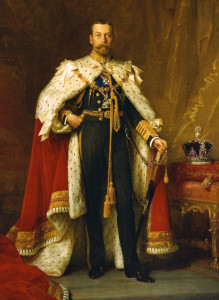The reasons that the legendary King George V decided to abandon all German names, titles and distinctions in 1917 are well known. And let’s face it, kind of obvious. The proud but down-to-earth emperor was dismayed by comments that he presided over an ‘uninspiring and alien court’ to which he famously responded that he may be uninspiring but he’d be damned if he was alien! Thus, against such peculiar circumstances, was the house of Windsor born.
What is less know (well, unless you’re a super call Royal-watcher like me) is that just a few months later, George took the opportunity to shrink the Royal family, restricting the title of Prince and Princess and virtually abolishing the style of Highness.
On 30 November 1917,of 1917, letters patent were issued declaring that henceforth only the children of the sovereign, sons of sons of the sovereign and the eldest son of the eldest son of the Prince of Wales would be entitles to the style of Royal Highness and the titular dignity of Prince of Princess. Hitherto, male-line great-grandchildren of a sovereign could also call themselves Prince or Princess with the style of Highness.
Despite my obsession with Royalty in general and Royal titles in particular, I have never come by much in terms of a reason for the King’s decisions. This is no doubt mainly down to the fact that I so far limited my search to the internet; I have never yet had the chance to trawl through many of the excellent biographies of the war-time King, something I would love to do when time allows. But it might also be because the King’s own thoughts on the matter were fairly guarded.
Nonetheless I thought whacking out some #QuickFireThoughts on the subject would make a compelling blog post. I have three (all entirely speculative) theories as to why he felt the title stripping necessary. The first two I think are quite credible; the third more of a #WildCard:
- George V wanted to start a fresh with the Royal family – It is quite believable that the earlier decision to Anglicise the house of Saxe-Coburgh-Gotha reminded everybody just how far flung the Royal family had become and just how intwined they were with continental (especially Germanic) Royalty. Perhaps the King also didn’t fancy the thought of a host of deposed demi-Royals from the continent fleeing to Britain and claiming Royal status as descendants of Queen Victoria for the next few years. This declaration would have limited Royalty almost (although not entirely) to those already domicile in the UK, largely eliminating that problem.
- In the wake of monarchies falling, the time seemed right to shrink down the family-firm – Everywhere you looked European monarchies were crumbling. The Russian Tsar had been forced to abdicate earlier that year, and it was pretty obvious that others weren’t far behind. So, perhaps the British monarchy did what it does best; modernise to survive! We know that George V was keen to pump a bit more British blood into the veins of the house of Windsor and would allow his children to take local spouses; this whole project would be easier if there were less potential Royals to marry off. Also, perhaps he felt that the new house of Windsor really needed a fresh start and should be contained, primarily to his descendants. Regardless of his motivation, the move boasted incredible foresight; had he not made this change, Britain today would be positively littered with Princes and Princesses.
- It was a personal vendetta against the Connaughts – Before I get into this, let me reiterate that this point firmly fits into the #WildCard category. But anyway, here we go! Although the 1917 letters patent but the ky-bosh on a number of continental royals potentially falling back on British titles once stripped of others, there was only one person who was actually affected by it at the time: Alastair, Earl of Macduff who prior to the LPs has been known as His Highness Prince Alastair of Connaught. I remember once reading somewhere (and I really can’t remember where) that George V had some kind of grudge against his Connaught cousins. Could it be that he wanted to alienate them from the Royal family. After all, young Alastair’s aunt, Princess Patricia of Connaught mysteriously ‘volunteered’ to give up her Royal style when she married in 1919. Perhaps this was no coincidence…
Anyway, perhaps one day I will have chance to read more about this and return to the subject. Until then, if anyone know more or has any views, I would be very grateful to hear them!
